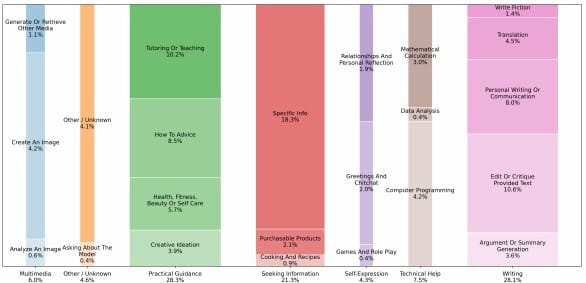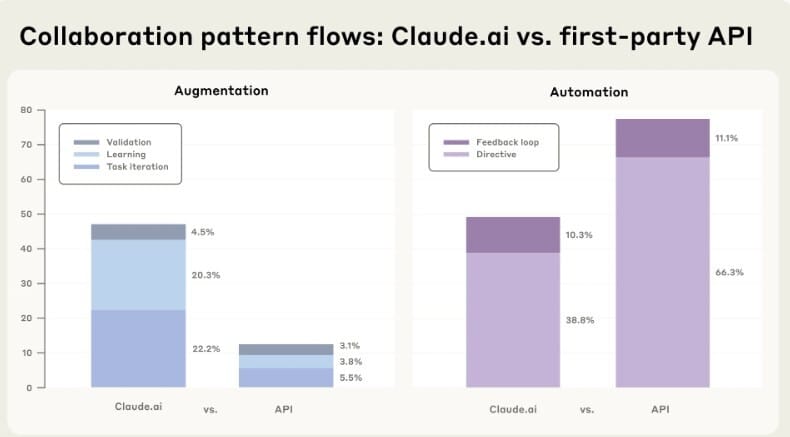Welcome to Jumble, your go-to source for AI news. This week, we check out OpenAI’s deep dive into how people use ChatGPT and Anthropic’s September Economic Index on where and how Claude is being adopted. Then, we break down Penske Media’s lawsuit against Google’s AI Overviews. Let’s dive in ⬇️
In today’s newsletter:
📊 What the new usage data really shows
📰 Publishers vs search: the AI Overviews suit
🌍 Aid projects use AI in conflict zones
🧩 China flags Nvidia on antitrust grounds
🧾 Weekly Challenge: Flip claims into counterclaims with AI
📊 Anthropic & OpenAI Reveal How We’re Using AI

Credit: OpenAI
OpenAI analyzed a massive, privacy-preserving sample of real ChatGPT conversations to answer a simple question: what do people actually do with these models? Three buckets dominate: practical guidance, information seeking, and writing.
The takeaway is not “work replacement,” but “decision support,” with consumer use outpacing office use in share terms.
Anthropic’s companion report looks at adoption through a different lens—geography and enterprise APIs—and arrives at a complementary picture: rapid growth, uneven diffusion, and rising task delegation inside businesses.
🎒 Not Just for Coders
OpenAI’s usage taxonomy shows coding is a small slice of overall consumer traffic, while the bulk lands in day-to-day help: planning, answering questions, and composing text.
Anthropic, by contrast, sees coding dominate in its enterprise API traffic, which makes sense: programmatic use favors repeatable tasks. The reports together suggest a split screen—consumers ask broad questions; businesses automate narrow ones that are easy to wire into systems.
🗺️ Where Adoption Concentrates
Anthropic’s geographic cuts show high per-capita usage clustering in wealthy, digitally mature countries and certain U.S. states. As adoption deepens, usage diversifies beyond coding into education, science, and business tasks.
Low-adoption regions lean more on full delegation; high-adoption regions show more “augmentation”—humans and AI iterating together. That pattern hints at an experience curve: the more comfortable people are, the more they co-pilot rather than auto-pilot.

Credit: Anthropic
🏭 Inside the Enterprise
Anthropic’s first-party API view is automation-heavy. Businesses use Claude to generate and transform code, handle office/admin workflows, and ingest structured inputs—contexts that are easy to centralize.
Cost per task matters less than capability and deployment fit, which is why higher-cost tasks can still dominate. The constraint isn’t just model quality; it’s whether firms can assemble the right context (docs, data, permissions) so the model can act.

Credit: Anthropic
🔮 What to Do With This
If you’re building with AI, match the surface to the job: chat for exploration and judgment; APIs for repeatable, well-scoped tasks. Expect uneven benefits: places and teams with better data plumbing and prompt habits will pull ahead. And measure “felt usefulness” alongside accuracy; most real-world value shows up as time saved deciding, not just facts retrieved.
Bottom line: Consumer AI is broad and assistive; enterprise AI is narrow and automated. Both are accelerating—just along different tracks.
🔍 Google Sued Over AI Overviews
Penske Media Corporation, the owner of Rolling Stone, Billboard, and Variety, has sued Google, arguing that “AI Overviews” lift publishers’ reporting into on-page summaries that depress clicks and revenue.
The complaint frames Overviews as an unlawful reuse of journalism and an abuse of search power, claiming users get answers without visiting the source. Google counters that AI features improve search quality and drive traffic.
⚖️ What’s at Stake
This isn’t just about one media company. If courts decide Overviews unlawfully repurpose copyrighted reporting or constitute unfair competition, the economics of AI answers could shift: more licensing, different ranking rules, or new disclosure duties. Even without a ruling, the case hardens a trend—publishers redirecting their legal fire from model trainers to distribution platforms.
📚 How We Got Here
This lawsuit follows years of tension between publishers and tech platforms. Earlier battles centered on search snippets, social sharing, and ad dominance; AI Overviews now add another layer by summarizing content directly.
The shift is significant: instead of merely pointing readers toward journalism, platforms may increasingly present themselves as the final stop. That makes the line between fair use, aggregation, and outright substitution harder to draw—and raises the stakes for every publisher that relies on referral traffic.
🧭 What to Watch Next
Key questions: how courts view “transformative” AI summaries at the top of results; whether opt-outs or robots rules matter; and how damages would be computed for lost traffic. Also watch for copycat suits or interventions from trade groups. For readers, expect more experiments with publisher paywalls and direct apps as outlets try to escape the squeeze.
The battle over who gets credit, and clicks, for answers has moved to the front page of search.
This Week’s Scoop 🍦
🧾 Weekly Challenge: Fact Swap
Challenge: This week, train yourself to spot weak claims by flipping them upside down.
Here’s what to do:
🔎 Step 1: Pick a claim
Grab one statement from your feed, a news app, or a work email. Example: “AI is replacing all entry-level jobs.”
🔄 Step 2: Invert it
Rewrite it as the opposite: “AI is not replacing all entry-level jobs.”
🤖 Step 3: Ask AI twice
Paste both into ChatGPT, Claude, or Gemini. Prompt: “Give me the strongest evidence this is true. Now give me the strongest evidence this is false.”
📝 Step 4: Compare
List which side has firmer sources, clearer data, or admits uncertainty.
🧭 Step 5: Save your notes
Title it “Claim vs Counterclaim – [Topic].” Add two lines on what you now believe.
Do this three times this week. By Friday, you’ll notice your feed feels less like noise and more like a debate you can navigate.
Want to sponsor Jumble?
Click below ⬇️
The way society is using AI has changed a lot in the last few years. How has it impacted your life? And, is this the lawsuit that breaks Google? We’d love to hear your thoughts! See you next time! 🚀
Stay informed, stay curious, and stay ahead with Jumble!
Zoe from Jumble


